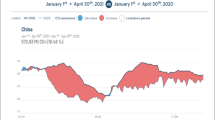Abstract
Besides static efficiency properties, environmental policies should be evaluated in terms of their longer-run impacts on investment and technological change to reduce pollution and degradation of natural resources. Using a stochastic dynamic programming approach, this paper analyzes how uncertainty about a future environmental tax on a polluting input alters investment in resource conservation and how such investment affects future demand for the polluting input. The impact on investment depends crucially on price elasticities of demand and on the manner in which investment shifts and rotates the demand schedule for the polluting input in the future. The expectation of a higher tax does not necessarily create stronger incentives for investment in resource conservation. More uncertainty about future policies does encourage investment if it makes a firm more responsive to future price changes and discourages investment if it makes a firm less responsive to price changes.
Similar content being viewed by others
References
Binswanger, H. P. (1974), ‘A Microeconomic Approach to Induced Innovation’, Economic Journal, December 84, 940–958.
Bohm, P. and C. S. Russell (1985), ‘Comparative Analysis of Alternative Polcy Instruments’, in A. V. Kneese and J. L. Sweeney, eds., Handbook of Natural Resource and Energy Economics, Vol. I, Elsevier Science Publishers B. V.
Caswell, M. F. and D. Zilberman (1986), ‘The Effects of Well Depth and Land Quality on the Choice of Irrigation Technology’, American Journal of Agricultural Economics 68, 798–811.
Chavas, J-P., R. Bishop, and K. Segerson (1986), ‘Ex Ante Consumer Welfare Evaluation in Cost-Benefit Analysis’, Journal of Environmental Economics and Management 13, 255–268.
Darwin, R. F. (1992), ‘Natural Resources and the Marshallian Effects of Input-Reducing Technological Changes’, Journal of Environmental Economics and Management, 23 201–215.
Downing, P. B. and L. J. White (1986), ‘Innovation in Pollution Control’, Journal of Environmental Economics and Management, 13 18–29.
Epstein, L. (1978), “Protection Flexibility and the Behaviour of the Competitive Firm under Price Uncertainty’, Review of Economic Studies, June 45, 251–262.
Hartman, R. (1976), ‘Factor Demand with Output Price Uncertainty’, American Economic Review, September 66, 675–681.
Kamien, M. and N. Schwartz (1968), ‘Optimal Induced Technical Change’, Econometrica, January 36, 1–17.
Kneese, A. V. and C. L. Schultze (1975), Pollution, Prices, and Public Policy, Brookings Institution, Washington, D.C.
Kon, Y. (1983), ‘Captial Input Choice Under Price Uncertainty: A Putty-Clay Technology Case’, International Economic Review 24, 183–197.
Magat, W. A. (1978), ‘Pollution Control and Technological Advance: A Dynamic Model of the Firm’, Journal of Environmental Economics and Management 5, 1–25.
Marin, A. (1991), ‘Firm Incentives to Promote Technological Change in Pollution Control: Comment’, Journal of Environmental Economics and Management 21, 297–300.
Marin, A. (1978), ‘The Choice of Efficient Pollution Policies: Technology and Economics in the Control of Sulphur Dioxide’, Journal of Environmental Economics and Management 5, 44–62.
McCain, R. A. (1978), ‘Endogenous Bias in Technical Progress and Environmental Policy’, American Economic Review 68, 538–546.
McHugh, R. (1985), ‘The Potential for Private Cost-Increasing Technological Innovation under a Tax-Based Economic Incentive Pollution Control Policy’, Land Economics 61, 58–64.
Mendelsohn, R. (1986), ‘Regulating Homogeneous Emissions’ Journal of Environmental Economics and Management 13, 301–312.
Meyer, J. (1987), ‘Two-Moment Decision Models and Expected Utility Maximization’, American Economic Review 77, 421–430.
Milliman, S. R. and R. Prince (1989), ‘Firm Incentives to Promote Technological Change in Pollution Control’, Journal of Environmental Ecnomics and Management 17, 247–265.
Orr, L. (1976), ‘Incentive for Innovation as the Basis for Effluent Charge Strategy’, American Economic Review, 66, 441–447.
Pindyck, R. S. (1991), ‘Irreversibility, Uncertainty, and Investment’, Journal of Economic Literature 29, 1110–1148.
Rader, T. (1968), ‘Normally, Inputs are Never Gross Substitutes’, Journal of Political Economy, February 78, 38–43.
Turnovsky, S. (1973), ‘Production Flexibility, Price Uncertainty and the Behavior of the Competitive Firm’, International Economic Review, June 14, 395–413.
Wenders, J. T. (1975), ‘Methods of Pollution Control and the Rate of Change in Pollution Abatement Technology’, Water Resources Research 11, 393–396.
Wright, B. D. (1984), ‘The Effects of Price Uncertainty on the Factor Choices of the Competitive Firm’, Southern Economic Journal 51, 443–455.
Zerbe, R. O. (1970), ‘Theoretical Efficiency in Pollution Control’, Western Economic Journal 8, 364–376.
Author information
Authors and Affiliations
Rights and permissions
About this article
Cite this article
Larson, B.A., Frisvold, G.B. Uncertainty over future environmental taxes. Environmental and Resource Economics 8, 461–471 (1996). https://doi.org/10.1007/BF00357414
Accepted:
Issue Date:
DOI: https://doi.org/10.1007/BF00357414




